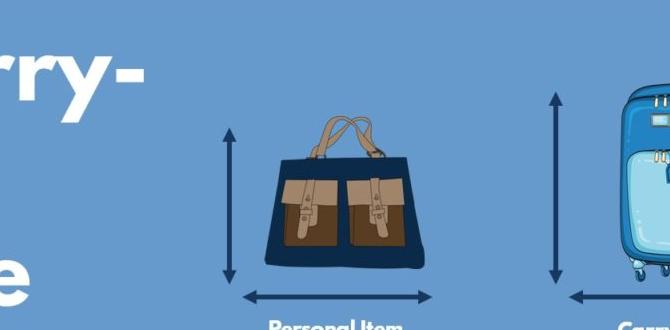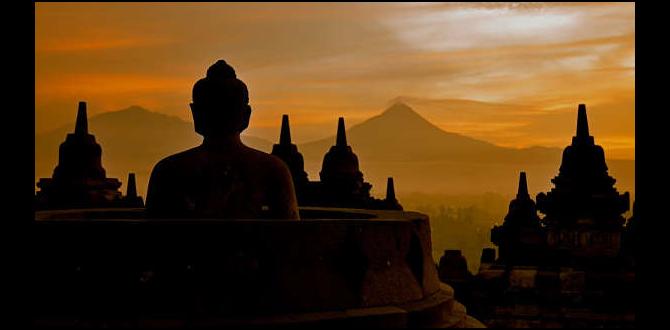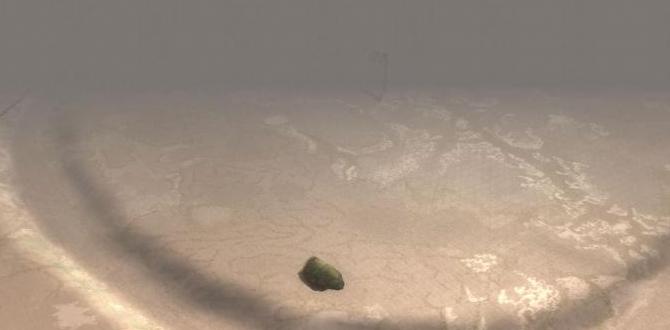Planning your Algeria 2 weeks itinerary can feel overwhelming, but this guide breaks it down! Discover a balanced route hitting historical sites, breathtaking landscapes, and vibrant cities comfortably. We’ll cover essential tips for a smooth, memorable adventure across this diverse North African gem, ensuring you get the most out of every moment.
Algeria, a land of ancient history and stunning natural beauty, often sparks wanderlust. But where do you start when planning a two-week trip? It’s easy to feel lost with so much to see! This guide is designed to give you a clear, actionable plan.
We’ll simplify the process, helping you craft an unforgettable journey without the stress. Get ready to explore ancient Roman ruins, lush oases, and bustling souks. We’ll show you how to make the most of your two weeks in Algeria, focusing on comfort and practicality every step of the way.
Why Two Weeks is Perfect for Algeria
Two weeks offers a fantastic opportunity to experience the diverse beauty and rich history of Algeria. It provides enough time to explore beyond the major cities, from the Roman marvels in the north to the awe-inspiring Sahara Desert in the south. This duration allows for a more relaxed pace, crucial for truly soaking in the culture and avoiding that rushed, “checking-off-a-list” feeling. It’s the sweet spot for balancing exploration with relaxation, making your Algerian adventure both comprehensive and enjoyable.
Essential Pre-Trip Preparations
Before you even think about packing, a few crucial steps will ensure your trip runs smoothly. Taking care of these basics will save you time and potential headaches later on. Getting organized now means you can focus purely on the excitement of your upcoming journey.
Visa Requirements
Algeria requires a visa for most nationalities. It’s essential to check the specific requirements for your country well in advance.
Application Process: Typically involves an application form, passport photos, passport, and proof of travel arrangements (like flight and hotel bookings).
Processing Time: Allow ample time for processing, as it can vary. Start this process at least 4-6 weeks before your planned departure.
Where to Apply: Usually through the Algerian embassy or consulate in your home country or a designated visa application center.
Best Time to Visit
The ideal time to visit Algeria depends on what you want to see.
Spring (March-May): Pleasant temperatures across most of the country, ideal for touring historical sites and enjoying the blooming landscapes. Coastal areas are mild.
Autumn (September-November): Similar to spring, with comfortable weather and fewer crowds than summer. The Sahara is particularly pleasant during these months.
Summer (June-August): Can be very hot, especially inland and in the Sahara. If visiting the desert, opt for shorter durations in the hotter months. Coastal cities are more bearable for this time.
Winter (December-February): Mild on the coast; can be cold and rainy. The Sahara can experience freezing temperatures at night, though daytime is often pleasant for exploration.
Travel Insurance
Comprehensive travel insurance is non-negotiable for any international trip, and Algeria is no exception. It protects you against unexpected medical emergencies, trip cancellations, lost luggage, and other unforeseen events.
Coverage to Look For: Medical expenses, emergency evacuation, trip interruption/cancellation, lost or stolen belongings.
Provider Research: Compare policies from reputable travel insurance providers to find one that best suits your needs and budget.
Currency and Budgeting
The currency in Algeria is the Algerian Dinar (DZD). While cards are accepted in larger hotels and some shops, cash is king, especially in smaller towns and markets.
Cash Withdrawal: ATMs are available in major cities, but inform your bank before traveling.
Budgeting: Algeria can be relatively affordable, but costs can add up. Key expenses include flights, accommodation, food, transport, and tours. Research average costs for each category to set a realistic budget.
Your 14-Day Algeria Adventure: A Balanced Itinerary
This itinerary is designed to give you a taste of Algeria’s diverse offerings, balancing historical immersion, natural wonders, and cultural experiences without feeling rushed. It’s a suggestion, and you can absolutely adjust it based on your interests!
Days 1-3: Algiers – The White City
Begin your Algerian journey in the vibrant capital, Algiers.
Day 1: Arrival and Casbah Exploration. Arrive at Houari Boumediene Airport (ALG). Transfer to your hotel. In the afternoon, immerse yourself in the labyrinthine alleys of the UNESCO-listed Casbah of Algiers. Discover its historic mosques, palaces, and secret courtyards.
Day 2: Museums and Modern Algiers. Visit the National Museum of Antiquities and Islamic Art for a deep dive into Algeria’s rich past. Explore the Notre-Dame d’Afrique basilica for panoramic city views. Later, stroll along the Promenade des Sablettes for a feel of modern Algiers.
Day 3: Day Trip to Tipasa. Take a day trip to the ancient Roman ruins of Tipasa, another UNESCO World Heritage site, perched by the Mediterranean Sea. Explore well-preserved amphitheatres, basilicas, and mosaics.
Days 4-6: Oran – The Andalusian Pearl
Travel west to Oran, Algeria’s second-largest city, known for its lively atmosphere and Andalusian heritage.
Day 4: Travel to Oran and City Landmarks. Take a scenic train or domestic flight to Oran. Check into your hotel. Explore the Santa Cruz Fortress for stunning views over the bay and the city. Visit the Grand Mosque of Oran.
Day 5: El Bahia Palace and Cultural Immersion. Discover the El Bahia Palace (Palais du Bey). Wander through the Place du 1er Novembre, the city’s main square. Enjoy the vibrant street life and perhaps catch some local music.
Day 6: Coastal Charms of Mers El-Kébir. Take a short trip to the nearby port town of Mers El-Kébir, known for its naval history. Enjoy the seaside ambiance and perhaps a fresh seafood dinner.
Days 7-9: Constantine – The City of Bridges
Head east to Constantine, a dramatic city perched on a rocky outcrop over a deep gorge.
Day 7: Arrival and Iconic Bridges. Fly or take a train to Constantine. Settle into your accommodation. The highlight here is crossing the spectacular Sidi M’Cid Bridge, offering breathtaking views of the gorge. Explore the Palace of Ahmed Bey.
Day 8: Roman Ruins of Timgad and Djemila. This is a big day for history lovers! Rent a car and driver or join a guided tour for day trips to two magnificent Roman archaeological sites: Timgad (Thamugadi), a remarkably preserved Roman colonial city, and Djemila (Cuicul), another UNESCO site known for its exceptional town plan and architecture.
Day 9: Exploring Constantine’s Old Town. Wander through Constantine’s old town, visit the Muqam El-Chahid (Martyrs’ Memorial) for historical insights, and enjoy the unique urban landscape connected by a series of impressive bridges.
Days 10-12: The Sahara Desert – Gateway to the Oasis
No trip to Algeria is complete without experiencing the magic of the Sahara. We’ll focus on the area around Timimoun or Ghardaïa for accessibility and traditional charm.
Day 10: Travel to the Sahara (Timimoun/Ghardaïa). Fly from Constantine to Ghardaïa (for the M’Zab Valley) or back towards Algiers and then a domestic flight to Timimoun. This will be a travel-intensive day. Settle into your desert accommodation – often a traditional ksar or a desert camp.
Day 11: Oasis Life and Desert Landscapes.
If in Ghardaïa: Explore the unique pentagonal city and its five distinct ksours. Visit local markets and learn about the Ibadite culture. Enjoy a camel ride at sunset.
If in Timimoun: Explore the red-soiled oasis town, known for its unique architecture. Take a guided 4×4 excursion into the dunes, visit a traditional Berber village, and witness the breathtaking colors of a Sahara sunset.
Day 12: Sahara Sunrise and Local Culture. Wake early for a magical Sahara sunrise. Enjoy traditional mint tea amidst the quiet beauty of the desert. Depending on your location, you might visit a palm grove or learn about the desert’s unique ecosystem.
Days 13-14: Return to Algiers & Departure
Day 13: Return to Algiers. Take a domestic flight back to Algiers. Spend your last day souvenir shopping, revisiting a favorite spot, or relaxing at a café.
Day 14: Departure. Enjoy a final Algerian breakfast before heading to Houari Boumediene Airport (ALG) for your departure.
Essential Travel Tips for Algeria
Navigating a new country can be a breeze with a few insider tips. These practical pieces of advice will help you travel more comfortably and confidently.
Accommodation Options
Algeria offers a range of lodging. Booking in advance, especially during peak season, is recommended.
Hotels: Available in cities, ranging from budget-friendly to luxurious.
Guesthouses (Maison d’hôtes): Often offer a more local experience.
Desert Camps/Auberges: Essential for exploring the Sahara. These can range from basic to glamping-style.
Transportation within Algeria
Getting around Algeria is part of the adventure!
Domestic Flights: The most efficient way to cover long distances between major cities like Algiers, Oran, Constantine, and desert gateways. Websites like Air Algérie are key.
Trains: A scenic and affordable option for inter-city travel, especially on the northern coast. Book tickets in advance if possible.
Buses: Extensive network, but can be slower and less comfortable than trains for long journeys.
Taxis: Available in cities for local transport. Agree on the fare before starting your journey or ensure the meter is used.
Car Rental: An option for independent travelers, though driving can be challenging outside major routes. Ensure you have an International Driving Permit.
Private Drivers/Tours: Highly recommended for visiting remote archaeological sites (like Timgad and Djemila) and for Sahara excursions, offering comfort and local knowledge.
Food and Drink
Algerian cuisine is a delightful blend of Mediterranean, Berber, and Arab influences.
Must-Try Dishes:
Couscous: The national dish, often served with vegetables and meat.
Tagine: A slow-cooked stew, usually made with meat, vegetables, and spices.
Mechoui: Whole roasted lamb or sheep, a delicacy for celebrations.
Rechta: A type of pasta with a rich stew.
Pastilla: A sweet and savory pie, often made with pigeon or chicken.
Street Food: Enjoy delicious pastries, sandwiches, and grilled meats from local vendors.
Drinks: Mint tea is ubiquitous and a symbol of hospitality. Freshly squeezed fruit juices and coffee are also widely available.
Water Safety: Stick to bottled water to avoid any stomach issues. Look for reputable brands.
Language basics
The official languages are Arabic and Tamazight. French is widely spoken in business and government, and often understood by educated Algerians. English is less common, especially outside tourist hubs. Learning a few basic Arabic or French phrases will be greatly appreciated.
Greetings: Salam Alaikum (Peace be upon you), Sabah el khair (Good morning), Masa el khair (Good evening).
Basic Phrases: Shukran (Thank you), Min fadlik (Please), Na’am (Yes), La (No), Afwan (You’re welcome / Excuse me).
Cultural Etiquette and Dress Code
Algeria is a predominantly Muslim country, and respecting local customs is important for a smooth and respectful trip.
Dress Modestly: Especially when visiting religious sites or rural areas. For women, this means covering shoulders and knees. A headscarf is often required for mosque entrances (sometimes provided). Men should also opt for longer trousers and shirts.
Respectful Behavior: Public displays of affection should be avoided. Be mindful of prayer times; some shops may close briefly.
Photography: Always ask permission before taking photos of people, especially women.
Hospitality: Algerians are known for their warmth and hospitality. If invited for tea or a meal, it’s a great honor to accept.
Comfort & Practicality: Staying Prepared on the Go
Traveling, especially for two weeks, requires staying comfortable and prepared for anything. From managing personal needs to ensuring you have the right gear, a little foresight goes a long way.
Staying Comfortable on Long Journeys
Whether it’s a long flight, a train ride, or a car journey across vast landscapes, comfort is key.
Comfortable Clothing: Pack breathable fabrics like cotton and linen. Loose-fitting clothing is ideal for warm weather and respecting local dress codes.
Travel Pillow and Blanket: Essential for getting rest on planes, trains, or buses.
Entertainment: Download books, music, or podcasts. A travel journal can also be a great companion.
Hydration and Snacks: Carry a reusable water bottle and some non-perishable snacks to keep you going between stops.
Managing Personal Care Needs
For travelers who require personal care assistance, planning is vital for peace of mind and comfort.
Adult Diapers/Incontinence Products: For long travel days, extended excursions, or simply for added security and confidence, well-fitting adult diapers or protective underwear can make a significant difference. Choosing breathable, high-absorbency options can help prevent leaks and skin irritation, especially in warmer climates. Brands like Depend or TENA offer a range of products suitable for different needs and activity levels. Discreet packaging can also be a consideration.
Child Diapers and Wipes: For families traveling with young children, ensuring a steady supply of diapers and wipes is paramount. Consider purchasing these at your destination if luggage space is a concern, or utilize travel-sized packs for the initial journey.
Hand Sanitizer: Maintain hygiene, especially when out and about.
Basic First-Aid Kit: Include essentials like band-aids, antiseptic wipes, pain relievers, and any personal medications.
What to Pack: The Essentials Checklist
Beyond clothing and personal care items, a few other things can enhance your Algerian adventure.
Documents: Passport, visa (if applicable), flight confirmations, hotel bookings, insurance details, driver’s license/IDP. Keep digital and physical copies.
Electronics: Phone, charger, universal travel adapter, power bank.
Sun Protection: High SPF sunscreen, sunglasses, wide-brimmed hat.
Comfortable Walking Shoes: You’ll be doing a lot of exploring!
Light Scarf or Shawl: Versatile for sun protection, warmth on cooler evenings, or for modest dress when needed.
Small Backpack or Daypack: For carrying essentials during daily excursions.
Reusable Water Bottle: Stay hydrated and reduce plastic waste.
Understanding Algerian Culture and Society
To truly appreciate Algeria, understanding its cultural nuances will enrich your experience. The country has a deep history, shaped by Amazigh (Berber), Arab, Ottoman, and French influences.
The Importance of Hospitality
Hospitality is central to Algerian culture. Guests are often treated with great respect and generosity.
Invitations: If invited to someone’s home, it’s considered polite to accept. Bring a small gift, like sweets or dates.
Tea Ceremony: Accepting mint tea is a common ritual and a sign of friendship.
Religious Observances
Algeria is a Muslim-majority country. While generally tolerant, understanding key practices is respectful.
Ramadan: If traveling during the holy month of Ramadan, be aware that many people fast from sunrise to sunset. Eating, drinking, and smoking in public during fasting hours is generally discouraged. Some restaurants may have limited hours or be closed during the day.
Mosques: Non-Muslims are generally not permitted to enter mosques, except for a few exceptions during specific hours (like the Ketchaoua Mosque in Algiers after its renovation). Always dress modestly when near religious sites.
Social Interactions
Greetings: A handshake is common, but a more formal greeting might involve placing the right hand over the heart.
Gender Interactions: In more conservative settings, it’s best to allow women to initiate handshakes. Men should be mindful of personal space.
Exploring Algeria Beyond the Itinerary
While this 14-day itinerary covers key highlights, Algeria has much more to offer. If you have more time or different interests, consider:
The Roman Ruins of Djemila: If you only have time for one Roman site, Djemila is often considered one of the most beautiful and well-preserved.
The M’Zab Valley: A UNESCO World Heritage site featuring five ancient fortified cities, testament to a unique Berber civilisation. Ghardaïa is the main gateway.
The Hoggar Mountains (Sahara): For adventurous travelers, the Hoggar Mountains offer dramatic volcanic landscapes, ancient rock art, and nomadic Tuareg culture. This requires more time and specialized tours.
Annaba: A coastal city in northeastern Algeria with a rich history, including Roman sites and the basilica of Saint Augustine.



